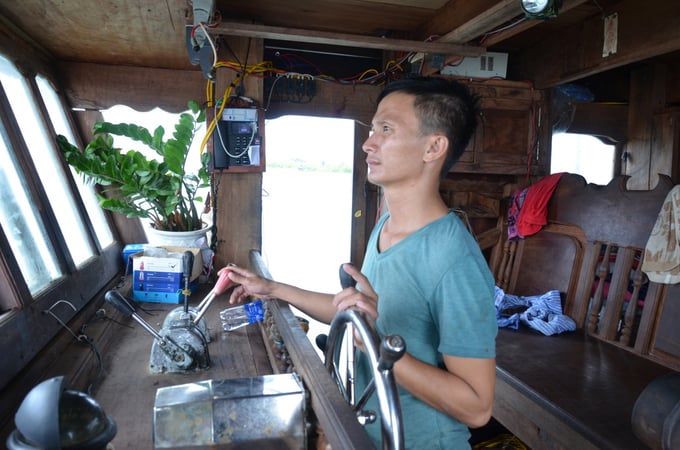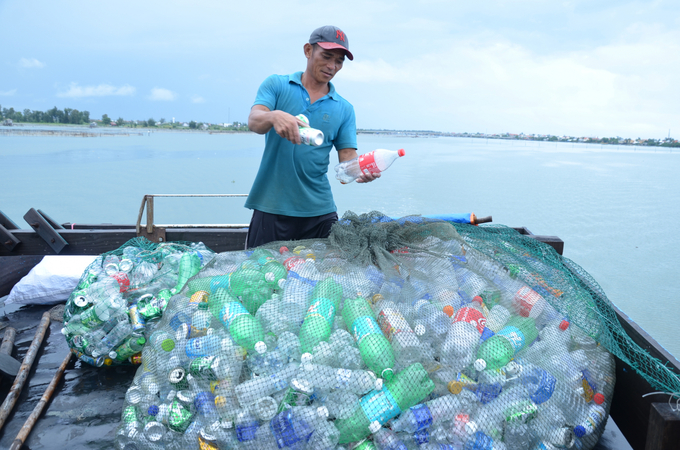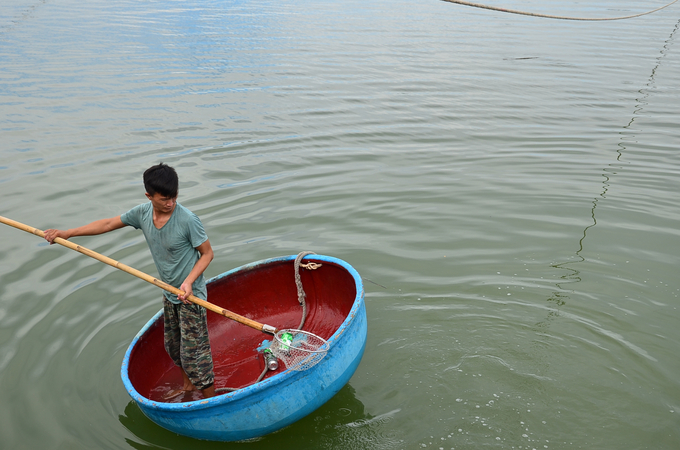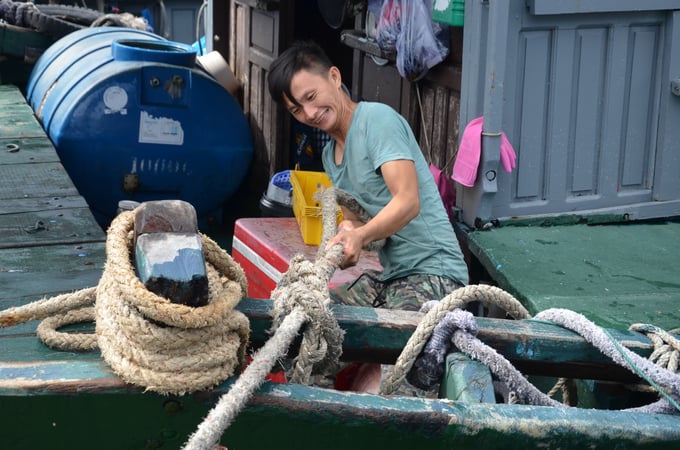June 17, 2025 | 19:38 GMT +7
June 17, 2025 | 19:38 GMT +7
Hotline: 0913.378.918
June 17, 2025 | 19:38 GMT +7
Hotline: 0913.378.918

Tran Van Cuong is the owner of a ship worth VND 3.5 billion. Photo: Duong Dinh Tuong.
Cuong's ship was full of fish and shrimp under the compartment, and ... garbage on the roof. Do Van No - a friend of Cuong, brought me up there to see the cans and plastic bottles contained in large mesh bags.
To Cuong, everything started so naturally. When he was in high school, he was admitted to the Ho Chi Minh Communist Youth Union (“the Union” in short). He participated in many cleaning sessions with his friends. After he graduated from school, he joined the Union of Thuan An ward (Hue city) and continued with the mission of cleansing the environment.
When his father built the ship, he went to work with him and realized something. If it was in the past, he could catch a lot of fish and shrimp near the shore, but later on, 30-40% of the batch he pulled up was trash.

Do Van No “boasting” about his ship’s roof that was full of trash. Photo: Duong Dinh Tuong.
“The garbage was taken out to the sea, and the wind pushed it back ashore, and at the end we would still have to pick it up. Things happened on and on, so a thought crossed my mind: ‘why not collect garbage right in the sea to reduce the impact on the environment, reduce the amount of garbage floating for the fish to multiply and flourish?’
From that idea, in 2016 I started collecting plastic waste to sell and raise charity for poor students overcoming difficulties in Thuan An ward. Everyone in the house kept saying things like, ‘Having too much free time? Such a meddler! There are many jobs for you to do, so why would you pick up those trashes?’. I just replied: ‘I take this business as my own. No one can stop me because I follow my own free will’.
Seeing me like that, the neighbors said, ‘You are just doing something useless. Why collect those few bottles when you don’t even lack the money? One can sold only get you VND 200. Here, let me give you VND 10,000, even VND 20,000 for charity. Why keep on suffering?’.
I replied: ‘I do this for a purpose and meaning, not to ask you to give me 10,000 VND or 20,000 VND to donate. That's your money, and this is my money, gained through my own blood and sweat. I pick up the bottles and that's good for the environment. This earth is warming up partly because of plastic waste!"
In 2018, Cuong saved nearly VND 1 billion. Borrowed some more from his friends, Cuong built a 1018 CV ship worth VND 3.5 billion, among the largest in the region, to do the seafood purchasing service at sea.
When he had his own boat, picking up trash became much easier. In his free time like noon and afternoon, he left the ship afloat. Whenever he saw garbage floating in the sea, he stood on the deck to pick it up with a racket. If he saw garbage in the distance, he would drop the basket boat to go out and pick it up. When the ship docked, he took advantage of his time and picked up more cans and garbage right on the fishing port or in the ice furnaces around the area. The man followed his wishes, ignoring the laughter and whisperings of those around him.

Tran Van Cuong picking up trash in the sea. Photo: Duong Dinh Tuong.
Tran Van Cuong confided that the life of fishermen was difficult nowadays because of the skyrocketing oil price. In the past each trip cost VND 40 million, now it is VND 60 million, while the fish is getting less and less, and the garbage is appearing more and more. Cuong simply finds joy when his friends hit a nice batch, and the ship owner would share a lot of money after each trip.
Not only in this life, but our next generations may also suffer the consequences
When Cuong realized that no matter how hard he worked, it was difficult to clean up the vast amount of garbage at sea alone. He then persuaded the companions on his ship. After listening to the explanation, those friends all agreed to follow Cuong. And not only on his ship, every time Cuong went for a drink, he would take the opportunity to share the idea with other ship owners. "I have a program to exchange trash for electric bulbs or flags. Guys, try to pick up trash and reuse it, don't throw it into the sea anymore. I am doing this so that the children of those who come with you brothers on the ship will have a better life. I can buy gifts and books, and give them away as presents."

Tran Van Cuong was anchoring the ship to avoid Typhoon Noru. Photo: Duong Dinh Tuong.
"Small rain lays great dust", now there are 15-17 ship owners in the area learning Cuong's model of picking up trash at sea. Many ships are also equipped with trash cans - something completely foreign to fishermen before. It takes about 3-4 months to collect a full ship roof of garbage, with each turn selling for approximately VND 500,000 - 600,000. Every time he went to the market, Cuong often put the changes in a piggy bank kept on the ship's cabin so that when it was full, he can bring out to create a scholarship fund for poor students.
Cuong did all the charity work anonymously. He only handed over the money to the Ward Secretary, and the gifts shall be given directly to the children. After that, the People's Committee of Thua Thien - Hue province launched the movement " Sunday Green Day", and Thuan An ward started the movement "Green houses on the sea" which called on fishermen to go to the beach to pick up recyclable waste to sell and raise funds to help poor students. Cuong and his friends felt even more motivated.
Translated by Samuel Pham
/2025/06/12/3721-2-202745_83.jpg)
(VAN) TH made an impression at Seoul Food 2025 with its line of natural beverages, paving the way for Vietnamese food products to enter the South Korean market.

(VAN) Soc Trang's success in rice exports stems from a strategy of developing fragrant and specialty rice cultivation areas and standardizing production toward low-emission practices.
/2025/06/11/1311-5-120811_839.jpg)
(VAN) The pig farming industry is facing the challenge of comprehensive restructuring to meet requirements for quality, safety, traceability, and market expansion both domestically and for export.

(VAN) Vietnam considers participating in ALGROALBA in order to expand agricultural production, coordinate the assessment and effective exploitation potential land.
/2025/06/05/5314-1-184727_407.jpg)
(VAN) From seemingly worthless fish scales and skin, enzymes and lactic ferments can transform by-products into peptides, opening a sustainable, effective business direction and elevating Vietnamese seafood.

(VAN) TTC AgriS and IFC signed a strategic partnership to develop a sustainable agricultural value chain, aiming to achieve the Net Zero target by 2035.

(VAN) Seafood by-products are opening a new path, combining green growth and technological innovation to enhance the industry's value.